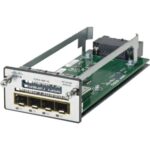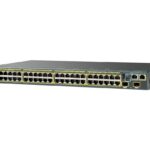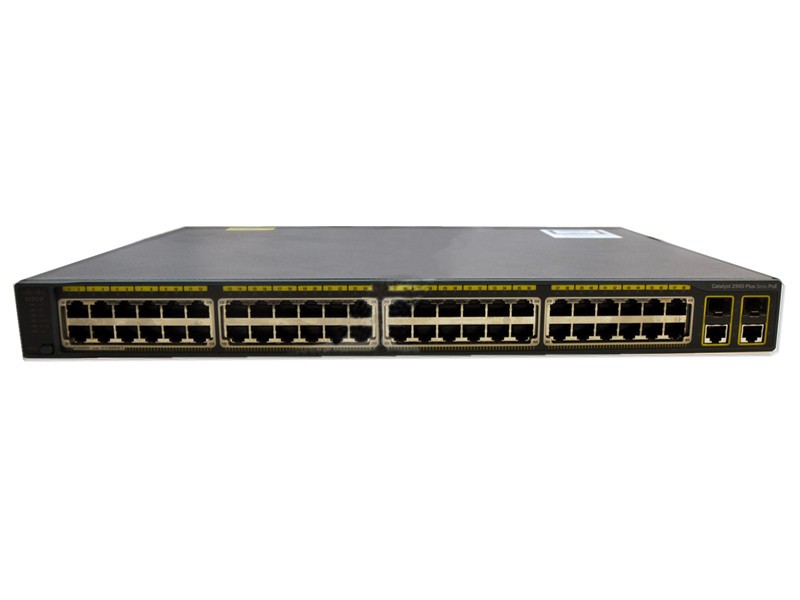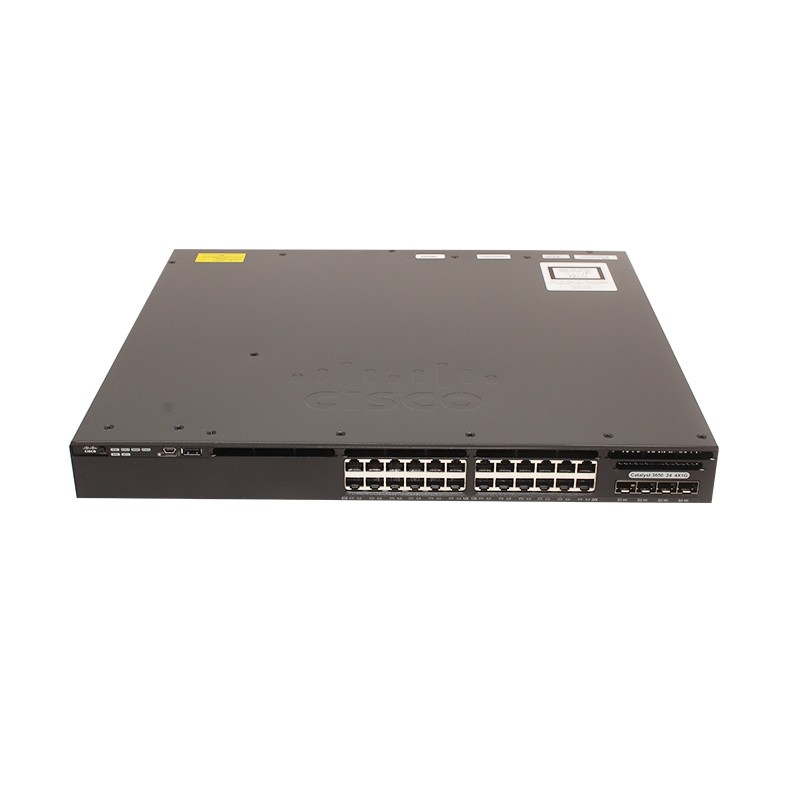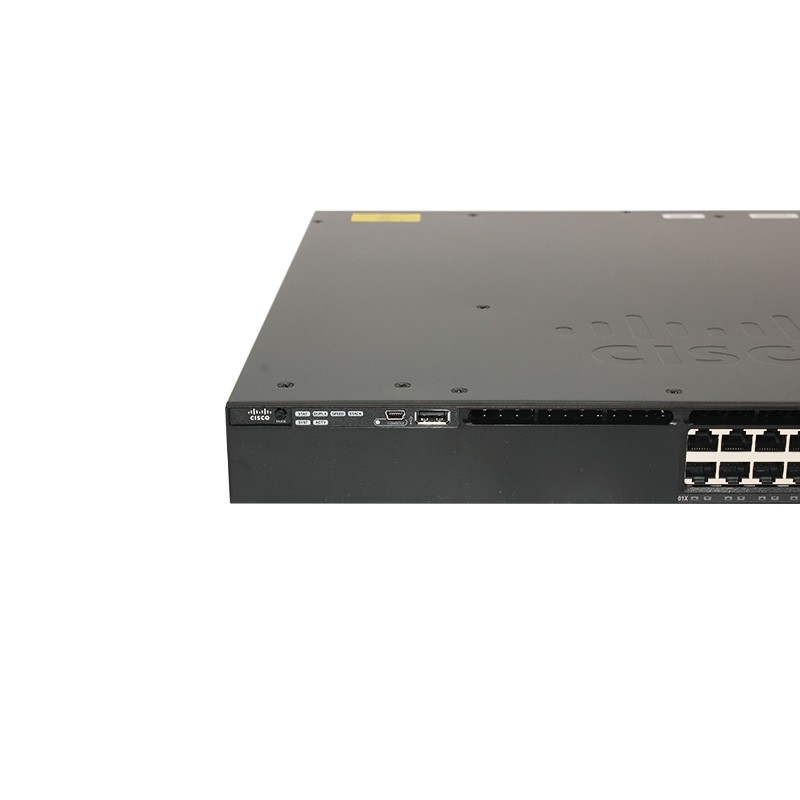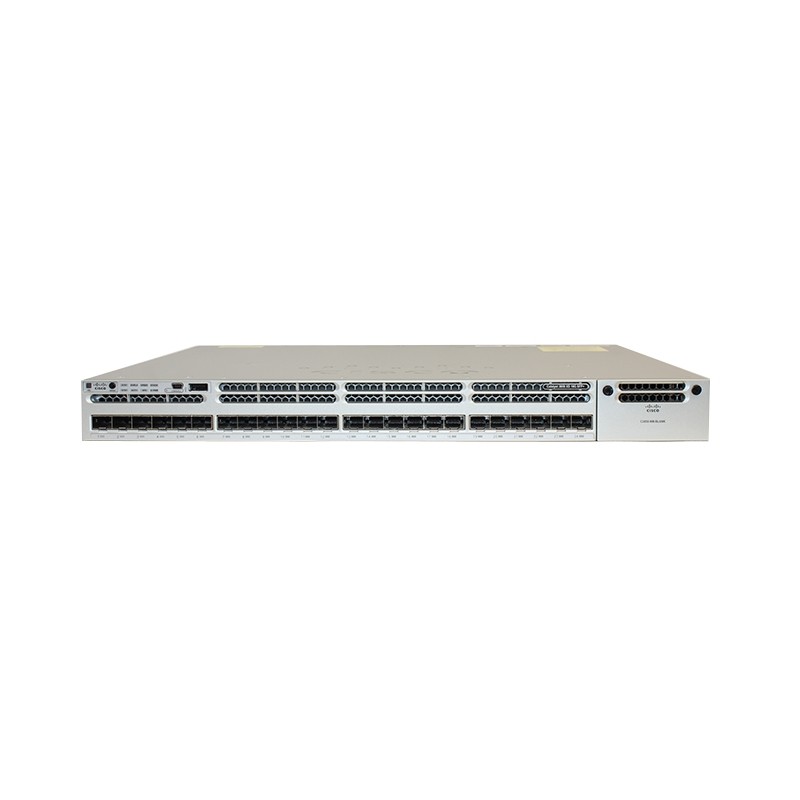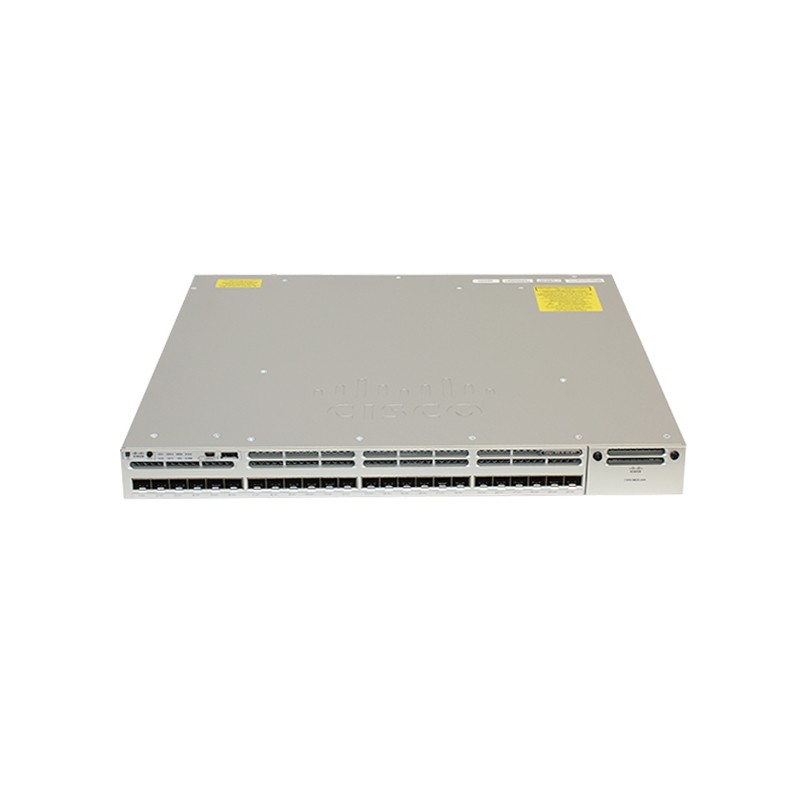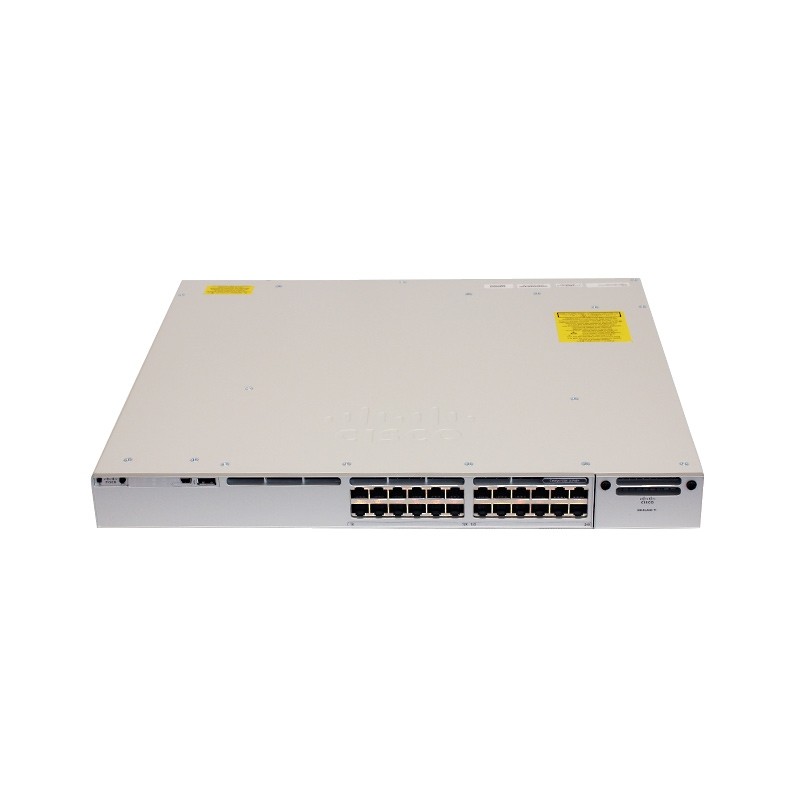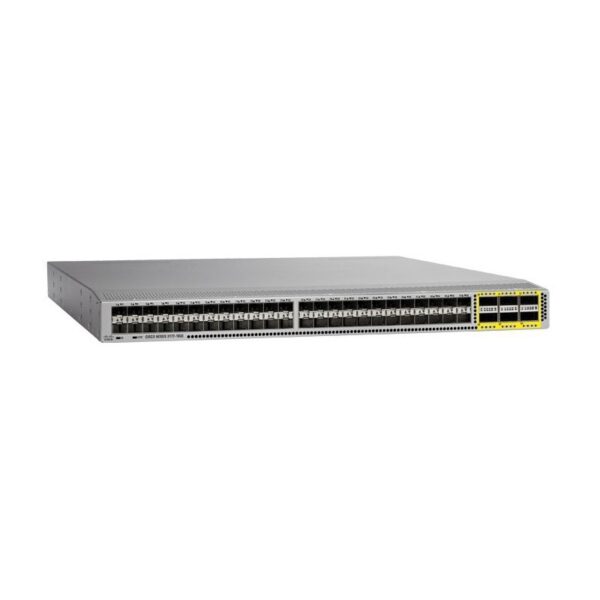
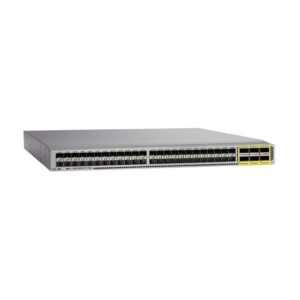
N3K-C3172PQ-XL
$26,075.00 Original price was: $26,075.00.$7,788.00Current price is: $7,788.00.
| Model: |
N3K-C3172PQ-XL – Cisco Nexus 3000 Series Switch |
| Detail: |
Nexus 3172PQ-XL Chassis, 48 SFP+, and 6 QSFP+ ports |
- Description
Description
The Cisco Nexus N3K-C3172PQ-XL switch is a thick, elite Layer 2 and 3 10 and 40-Gbps switch that is an individual from the Cisco Nexus 3100 switches. The Nexus 3100 switch is the Cisco Nexus 3000 arrangement switches and offers improved port thickness, versatility, and highlights contrasted with the original switches. Gear Net Technologies upholds both forward and invert wind stream plans with AC and DC power inputs. The Cisco Nexus 3172PQ is appropriate for server farms that require a financially savvy, power-productive line-rate Layer 2 and 3 top-of-rack (ToR) switch.
Cisco Nexus 3172PQ is a 10-Gbps upgraded Small Form-Factor Pluggable (SFP+)- based ToR switch with 48 SFP+ ports and 6 Quad SFP+ (QSFP+) ports. Each SFP+ port can work in 100-Mbps, 1-Gbps, or 10-Gbps mode, and each QSFP+ port can work in local 40-Gbps or 4 x 10-Gbps mode. This switch is a genuine phy-less switch that is streamlined for low dormancy and low force utilization.
Main Features N3K-C3172PQ-XL
Bundle
switch
L3
managed
48 x SFP+ + 6 x QSFP+
rack-mountable
with 4 Bidi
N3K-C3172PQ-XL Specifications |
|||
| Physical N3K-C3172PQ-XL | ● 1RU fixed form factor
● 72 x 10 Gigabit Ethernet ports (48 SFP+ and 6 QSFP+) ◦ 48 SFP ports support 1 and 10 Gigabit Ethernet ◦ 6 QSFP ports support 4 x 10 Gigabit Ethernet or 40 Gigabit Ethernet each ● Redundant fans (3+1) ● 2 redundant power supplies ● Management, console, and USB flash-memory ports |
||
| Performance N3K-C3172PQ-XL | ● 1.4-Tbps switching capacity
● Forwarding rate of up to 1 bps ● Line-rate traffic throughput (both Layer 2 and 3) on all ports ● Configurable maximum transmission units (MTUs) of up to 9216 bytes (jumbo frames) |
||
| Hardware tables and scalability | Number of MAC addresses | 288,000 | |
| Number of VLANs | 4096 | ||
| Number of spanning-tree instances | ● RSTP: 512
● MSTP: 64 |
||
| Number of ACL entries | ● 4000 ingress
● 1000 egress |
||
| Routing table | ● 16,000 prefixes and 16,000 host entries*
● 8000 multicast routes* |
||
| Number of EtherChannels | 64 (with PC) | ||
| Number of ports per EtherChannel | 32 | ||
| System memory | 8 GB | ||
| Buffer size | 12 MB shared | ||
| Boot flash | 16 GB | ||
| Power N3K-C3172PQ-XL | Number of power supplies | 2 | |
| Power supply types | ● AC (forward and reversed airflow)
◦ – N2200-PAC-400W and N2200-PAC-400W-B (PQ models)◦ – NXA-PAC-500W and NX-PAC-500W-B (TQ models) ● DC (forward and reversed airflow) ◦ – N2200-PDC-400W and N3K-PDC-350W-B (PQ models) ◦ – NXA-PDC-500W and NX-PDC-500W-B (TQ models) |
||
| Typical operating power | 143 W | ||
| Maximum power | 293W | ||
| AC PSUs
● Input voltage ● Frequency ● Efficiency |
● 100 to 240 VAC ● 50 to 60 Hz ● 89 to 91% at 220V |
||
| DC PSUs
● Input voltage ● Maximum current (PSU output – System input) ● Efficiency |
● –40 to –72 VDC ● 33A (400W unit), 42A (500W unit) ● 85 to 88% |
||
| Typical heat dissipation | 488 BTU/hr | ||
| Maximum heat dissipation | 1000 BTU/hr | ||
| Cooling N3K-C3172PQ-XL | ● Forward and reversed airflow schemes:
◦ Forward airflow: Port-side exhaust (air enters through fan-tray and power supplies and exits through ports) ◦ Reversed airflow: Port-side intake (air enters through ports and exits through fan-tray and power supplies) ● Redundant fans ● Hot-swappable (must swap within 1 minute) |
||
| Sound N3K-C3172PQ-XL | Measured sound power (maximum)
● Fan speed: 40% duty cycle ● Fan speed: 70% duty cycle ● Fan speed: 100% duty cycle |
● 64.9 dBA
● 69.3 dBA ● 76.7 dBA |
|
| Environment | Dimensions (height x width x depth) |
1.72 x 17.3 x 17 in. (4.4 x 43.9 x 43.2 cm) | |
| Weight | 18.6 lb (8 4 kg) | ||
| Operating temperature | ● 32 to 104°F (0 to 40°C) | ||
| Storage temperature | ● -40 to 158°F (-40 to 70°C) | ||
| Operating relative humidity | ● 10 to 85% noncondensing
● Up to 5 days at maximum (85%) humidity ● Recommend ASHRAE data center environment |
||
| Storage relative humidity | ● 5 to 95% noncondensing | ||
| Altitude | ● 0 to 10,000 ft (0 to 3000m) | ||
|
Safety and EMC |
|||
| Regulatory compliance | ● Products should comply with CE Markings per directives 2004/108/EC and 2006/95/EC. | ||
| Safety | ● UL 60950-1 Second Edition
● CAN/CSA-C22.2 No. 60950-1 Second Edition ● EN 60950-1 Second Edition ● IEC 60950-1 Second Edition ● AS/NZS 60950-1 ● GB4943 |
||
| EMC: Emissions | ● 47CFR Part 15 (CFR 47) Class A
● AS/NZS CISPR22 Class A ● CISPR22 Class A ● EN55022 Class A ● ICES003 Class A ● VCCI Class A ● EN61000-3-2 ● EN61000-3-3 ● KN22 Class A ● CNS13438 Class A |
||
| EMC: Immunity | ● EN55024
● CISPR24 ● EN300386 ● KN24 |
||
| RoHS | ● RoHS 5 compliant except for lead press-fit connectors | ||
|
Management and Standards Support |
|||
| MIB Support | Generic MIBs
● SNMPv2-SMI ● CISCO-SMI ● SNMPv2-TM ● SNMPv2-TC ● IANA-ADDRESS-FAMILY-NUMBERS-MIB ● IANAifType-MIB ● IANAiprouteprotocol-MIB ● HCNUM-TC ● CISCO-TC ● SNMPv2-MIB ● SNMP-COMMUNITY-MIB ● SNMP-FRAMEWORK-MIB ● SNMP-NOTIFICATION-MIB ● SNMP-TARGET-MIB ● SNMP-USER-BASED-SM-MIB ● SNMP-VIEW-BASED-ACM-MIB ● CISCO-SNMP-VACM-EXT-MIB ● MAU-MIB ● CISCO-SWITCH-QOS-MIB ● CISCO-CLASS-BASED-QOS-MIB Ethernet MIBs ● CISCO-VLAN-MEMBERSHIP-MIB ● LLDP-MIB ● IP-MULTICAST-MIB Configuration MIBs ● ENTITY-MIB ● IF-MIB ● CISCO-ENTITY-EXT-MIB ● CISCO-ENTITY-FRU-CONTROL-MIB ● CISCO-ENTITY-SENSOR-MIB ● CISCO-SYSTEM-MIB ● CISCO-SYSTEM-EXT-MIB ● CISCO-IP-IF-MIB ● CISCO-IF-EXTENSION-MIB ● CISCO-NTP-MIB ● CISCO-VTP-MIB ● CISCO-IMAGE-MIB ● CISCO-IMAGE-UPGRADE-MIB |
Monitoring MIBs
● NOTIFICATION-LOG-MIB ● CISCO-SYSLOG-EXT-MIB ● CISCO-PROCESS-MIB ● RMON-MIB ● CISCO-RMON-CONFIG-MIB ● CISCO-HC-ALARM-MIB Security MIBs ● CISCO-AAA-SERVER-MIB ● CISCO-AAA-SERVER-EXT-MIB ● CISCO-COMMON-ROLES-MIB ● CISCO-COMMON-MGMT-MIB ● CISCO-SECURE-SHELL-MIB Miscellaneous MIBs ● CISCO-LICENSE-MGR-MIB ● CISCO-FEATURE-CONTROL-MIB ● CISCO-CDP-MIB ● CISCO-RF-MIB Layer 3 and Routing MIBs ● UDP-MIB ● TCP-MIB ● OSPF-MIB ● BGP4-MIB ● CISCO-HSRP-MIB |
|
| Standards | ● IEEE 802.1D: Spanning Tree Protocol
● IEEE 802.1p: CoS Prioritization ● IEEE 802.1Q: VLAN Tagging ● IEEE 802.1s: Multiple VLAN Instances of Spanning Tree Protocol ● IEEE 802.1w: Rapid Reconfiguration of Spanning Tree Protocol ● IEEE 802.3z: Gigabit Ethernet ● IEEE 802.3ad: Link Aggregation Control Protocol (LACP) ● IEEE 802.3ae: 10 Gigabit Ethernet (Cisco Nexus 3064-X) ● IEEE 802.3ba: 40 Gigabit Ethernet ● IEEE 802.3an:10GBASE-T (Cisco Nexus 3064-T) ● IEEE 802.1ab: LLDP ● IEEE 1588-2008: Precision Time Protocol (Boundary Clock) |
||
| RFC | BGP
● RFC 1997: BGP Communities Attribute ● RFC 2385: Protection of BGP Sessions with the TCP MD5 Signature Option ● RFC 2439: BGP Route Flap Damping ● RFC 2519: Framework for Interdomain Route Aggregation ● RFC 2545: Use of BGPv4 Multiprotocol Extensions ● RFC 2858: Multiprotocol Extensions for BGPv4 ● RFC 3065: Autonomous System Confederations for BGP ● RFC 3392: Capabilities Advertisement with BGPv4 ● RFC 4271: BGPv4 ● RFC 4273: BGPv4 MIB: Definitions of Managed Objects for BGPv4 ● RFC 4456: BGP Route Reflection ● RFC 4486: Subcodes for BGP Cease Notification Message ● RFC 4724: Graceful Restart Mechanism for BGP ● RFC 4893: BGP Support for 4-Octet AS Number Space OSPF ● RFC 2328: OSPF Version 2 ● 8431RFC 3101: OSPF Not-So-Stubby-Area (NSSA) Option ● RFC 3137: OSPF Stub Router Advertisement ● RFC 3509: Alternative Implementations of OSPF Area Border Routers ● RFC 3623: Graceful OSPF Restart ● RFC 4750: OSPF Version 2 MIB RIP ● RFC 1724: RIPv2 MIB Extension ● RFC 2082: RIPv2 MD5 Authentication ● RFC 2453: RIP Version 2 IP Services ● RFC 768: UDP ● RFC 783: Trivial File Transfer Protocol (TFTP) ● RFC 791: IP ● RFC 792: ICMP ● RFC 793: TCP ● RFC 826: ARP ● RFC 854: Telnet ● RFC 959: FTP ● RFC 1027: Proxy ARP ● RFC 1305: Network Time Protocol (NTP) Version 3 ● RFC 1519: Classless Interdomain Routing (CIDR) ● RFC 1542: BootP Relay ● RFC 1591: Domain Name System (DNS) Client ● RFC 1812: IPv4 Routers ● RFC 2131: DHCP Helper ● RFC 2338: VRRP IP Multicast ● RFC 2236: IGMPv2 ● RFC 3376: IGMPv3 ● RFC 3446: Anycast Rendezvous Point Mechanism Using PIM and MSDP ● RFC 3569: Overview of SSM ● RFC 3618: MSDP ● RFC 4601: PIM-SM: Protocol Specification (Revised) ● RFC 4607: SSM for IP ● RFC 4610: Anycast-RP using PIM ● RFC 5132: IP Multicast MIB |
||
|
Software Features |
|||
| Layer 2 | ● Layer 2 switch ports and VLAN trunks
● IEEE 802.1Q VLAN encapsulation ● Support for up to 4096 VLANs ● Rapid Per-VLAN Spanning Tree Plus (PVRST+) (IEEE 802.1w compatible) ● MSTP (IEEE 802.1s): 64 instances ● Spanning Tree PortFast ● Spanning Tree Root Guard ● Spanning Tree Bridge Assurance ● Cisco EtherChannel technology (up to 32 ports per EtherChannel) ● LACP: IEEE 802.3ad ● Advanced port-channel hashing based on Layer 2, 3, and 4 information ● vPC ● Jumbo frames on all ports (up to 9216 bytes) ● Storm control (unicast, multicast, and broadcast) ● Private VLANs ● NvGRE entropy ● Resilient hashing |
||
| Layer 3 | ● Layer 3 interfaces: Routed ports on interfaces, switch virtual interfaces (SVIs), port channels, and subinterfaces (total: 1024)
● 64-way ECMP ● 4000 ingress and 1000 egress ACL entries ● IPv6 routing: Static, OSPFv3, and BGPv6 ● Routing protocols: Static, RIPv2, EIGRP, OSPF, and BGP ● Bidirectional Flow Detection (BFD) for BGP, OSPF, and IPv4 static routes ● HSRP and VRRP ● ACL: Routed ACL with Layer 3 and 4 options to match ingress and egress ACLs ● VRF: VRF-lite (IP VPN), VRF-aware unicast (BGP, OSPF, and RIP), and VRF-aware multicast ● Unicast Reverse-Path Forwarding (uRPF) with ACL; strict and loose modes ● Jumbo frame support (up to 9216 bytes) ● Generic Routing Encapsulation (GRE) tunneling ● Advanced BGP features including BGP add-path for eBGP and iBGP, remove-private-as enhancements and eBGP next hop unchanged ● IP-in-IP Tunnel support |
||
| Multicast | ● Multicast: PIMv2, PIM-SM, and PIM-SSM
● Bootstrap router (BSR), Auto-RP, and Static RP ● MSDP and Anycast RP ● Internet Group Management Protocol (IGMP) Versions 2 and 3 |
||
| Quality of Service (QoS) | ● Layer 2 IEEE 802.1p (class of service [CoS])
● 8 hardware queues per port ● Per-port QoS configuration ● CoS trust ● Port-based CoS assignment ● Modular QoS CLI (MQC) compliance ● ACL-based QoS classification (Layers 2, 3, and 4) ● MQC CoS marking ● Differentiated services code point (DSCP) marking ● Weighted Random Early Detection (WRED) ● CoS-based egress queuing ● Egress strict-priority queuing ● Egress port-based scheduling: Weighted Round-Robin (WRR) ● Explicit Congestion Notification (ECN) ● Configurable ECN marking per port ● Priority Flow Control (with 3 no-drop queues and 1 default queue with strict priority scheduling between queues ● Policy Based Routing (PBR) |
||
| Security | ● Ingress ACLs (standard and extended) on Ethernet
● Standard and extended Layer 3 and 4 ACLs include IPv4, Internet Control Message Protocol (ICMP), TCP, and User Datagram Protocol (UDP) ● VLAN-based ACLs (VACLs) ● Port-based ACLs (PACLs) ● Named ACLs ● ACLs on virtual terminals (vtys) ● DHCP snooping with Option 82 ● Port number in DHCP Option 82 ● DHCP relay ● Dynamic Address Resolution Protocol (ARP) inspection ● Configurable CoPP ● SPAN with ACL filtering |
||
| Cisco Nexus Data Broker | ● Topology support for TAP and SPAN aggregation
● Support for QinQ to tag input source TAP and SPAN ports ● Configuration of symmetric hashing to load-balance traffic to multiple tools ● Traffic filtering based on Layer 1 through Layer 4 header information ● Traffic replication and forwarding to multiple monitoring tools ● Robust RBAC ● Northbound representational state transfer (REST) API for all programmability support |
||
| Management | ● POAP
● Python scripting ● Cisco EEM ● Switch management using 10/100/1000-Mbps management or console ports ● CLI-based console to provide detailed out-of-band management ● In-band switch management ● Locator and beacon LEDs ● Configuration rollback ● SSHv2 ● Secure Copy (SCP) server ● Telnet ● AAA ● AAA with RBAC ● RADIUS ● TACACS+ ● Syslog ● Syslog generation on system resources (for example, FIB tables) ● Embedded packet analyzer ● SNMP v1, v2, and v3 ● Enhanced SNMP MIB support ● XML (NETCONF) support ● Remote monitoring (RMON) ● Advanced Encryption Standard (AES) for management traffic ● Unified username and passwords across CLI and SNMP ● Microsoft Challenge Handshake Authentication Protocol (MS-CHAP) ● Digital certificates for management between switch and RADIUS server ● Cisco Discovery Protocol Versions 1 and 2 ● RBAC ● SPAN on physical layer, port channel, and VLAN ● Tunable buffer allocation for SPAN ● Encapsulated Remote SPAN (ERSPAN) ● Ingress and egress packet counters per interface ● PTP (IEEE 1588) boundary clock ● Network Time Protocol (NTP) ● Cisco OHMS ● Comprehensive bootup diagnostic tests ● Cisco Call Home ● Cisco DCNM ● Advanced buffer utilization monitoring ● SFlow |
||


